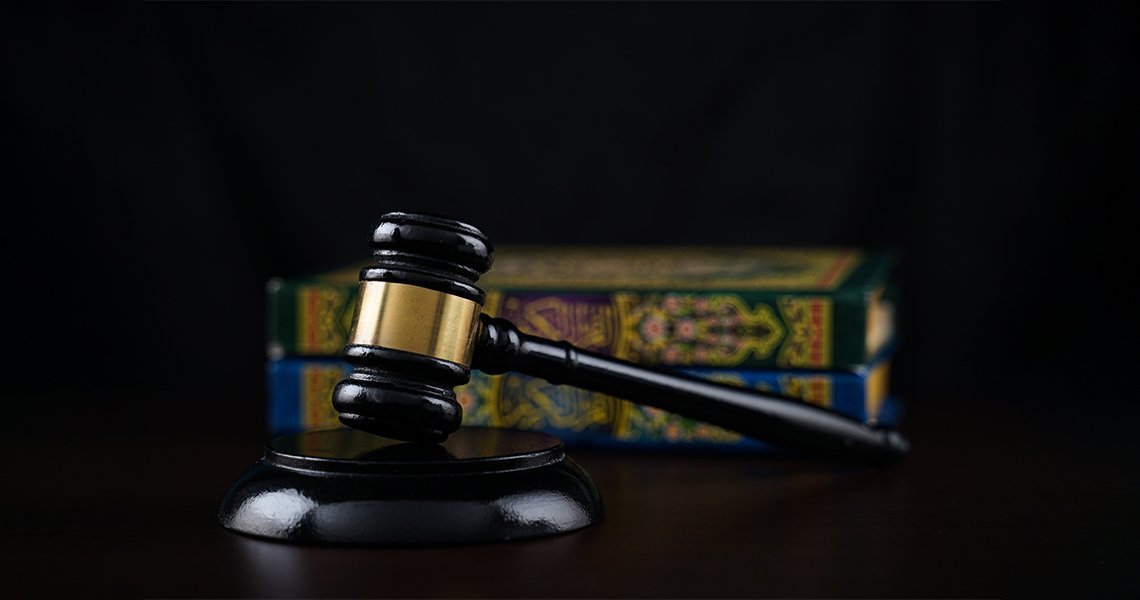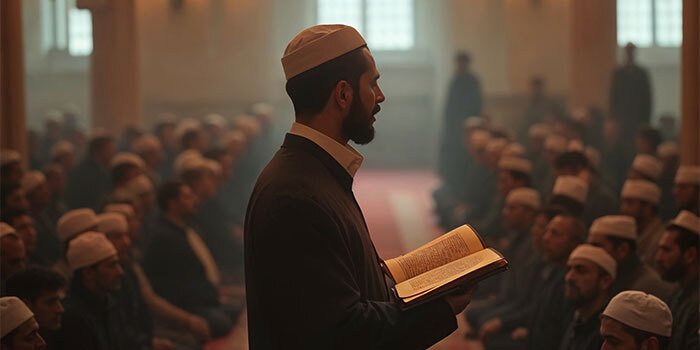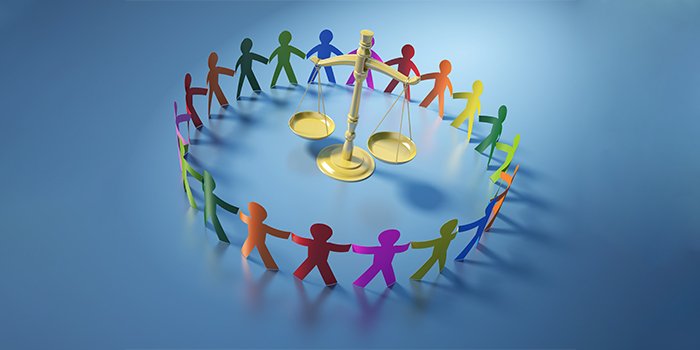When the Heart Feels Heavy
Oct 29, 2025

Justice is more than just a legal concept; it’s a driving principle deeply intertwined with society. While its definition is generally understood, within Islam, the concept of justice carries many meanings. Indeed, what is humanity without justice? For any practicing Muslim wanting to deepen their connection with the Creator and refine their character, truly understanding divine justice and equality as described in the Quran is essential.

Throughout history, renowned Islamic scholars have explored the meaning of justice and offered further insight from their own perspectives.
Some popular definitions are:
These profound definitions highlight that justice in Islam fundamentally means aligning one’s life with Islamic teachings. This includes upholding the respect and rights commanded by the Sharia (law) and strictly avoiding what it prohibits.
The example of parents demonstrates this: Allah (SWT) bestowed parents with the utmost honor and dignity, commanding children to be obedient in all circumstances and forbidding any disrespectful speech. To emphasize this, Allah (SWT) deemed a child’s disobedience as a major sin.
However, this honor is not absolute, and their commands are to be obeyed only within the confines of Islam. For example, if parents were to command un-Islamic actions, their children should not obey. This delicate balance is divine justice: prioritizing Sharia law and following all that Allah (SWT) has ordained. Nevertheless, even when acting on this principle, unwavering respect is expected to be maintained when interacting with parents.

The teachings in the Quran demonstrate what justice truly is. It clearly defines what’s considered acceptable and unacceptable, providing a strong framework to prevent injustice. The following Quranic verses illustrate exactly how significant equality is in Islam:
إِنَّ اللَّهَ يَأْمُرُ بِالْعَدْلِ وَالْإِحْسَانِ وَإِيتَاءِ ذِي الْقُرْبَىٰ وَيَنْهَىٰ عَنِ الْفَحْشَاءِ وَالْمُنكَرِ وَالْبَغْيِ ۚ يَعِظُكُمْ لَعَلَّكُمْ تَذَكَّرُونَ
Indeed, Allah orders justice and good conduct and giving to relatives and forbids immorality and bad conduct and oppression. He admonishes you that perhaps you will be reminded. (Surah An’Nahal:90)
وَإِذَا قُلْتُمْ فَاعْدِلُوا وَلَوْ كَانَ ذَا قُرْبَىٰ
And when you testify, be just, even if [it concerns] a near relative. (Surah Al-Anaam:152)
قُلْ أَمَرَ رَبِّي بِالْقِسْطِ
Say, [O Muhammad], “My Lord has ordered justice. (Surah Al-A’araf:29)
يَا أَيُّهَا الَّذِينَ آمَنُوا كُونُوا قَوَّامِينَ بِالْقِسْطِ شُهَدَاءَ لِلَّهِ وَلَوْ عَلَىٰ أَنفُسِكُمْ أَوِ الْوَالِدَيْنِ وَالْأَقْرَبِينَ ۚ إِن يَكُنْ غَنِيًّا أَوْ فَقِيرًا فَاللَّهُ أَوْلَىٰ بِهِمَا ۖ فَلَا تَتَّبِعُوا الْهَوَىٰ أَن تَعْدِلُوا ۚ وَإِن تَلْوُوا أَوْ تُعْرِضُوا فَإِنَّ اللَّهَ كَانَ بِمَا تَعْمَلُونَ خَبِيرًا
O you who have believed, be persistently standing firm in justice, witnesses for Allah, even if it be against yourselves or parents and relatives. Whether one is rich or poor, Allah is more worthy of both. So follow not [personal] inclination, lest you not be just. And if you distort [your testimony] or refuse [to give it], then indeed Allah is ever, with what you do, acquainted. (Surah An’Nisa:135)
وَأُمِرْتُ لِأَعْدِلَ بَيْنَكُمُ
And I have been commanded to do justice among you. (Surah Ash’Sura:15)

Beyond the Quran, the Prophet Muhammad’s (PBUH) Sunnah, consisting of both his actions and sayings, powerfully reinforces the necessity of justice in every facet of life. A plethora of Hadith illustrate this principle:
With these verses and narrations, these facts about justice become increasingly obvious
The importance of justice in Islam becomes explicitly clear from the combined wisdom of the Quran and the Hadith. It isn’t merely a recommendation; it’s an obligatory command from Allah (SWT) that applies to every aspect of a Muslim’s life. Deliberately neglecting His divine will by displaying an unjust attitude, even in one part of life, constitutes as a punishable sin.
Therefore, the Messenger (PBUH) declared that the practice of equality and fairness is a religious obligation for every believer in their life.
He said in a Hadith:
“Every one of you is a guardian and every one of you is responsible (to do justice). A ruler is a guardian and is responsible (for his subjects); a man is a guardian of his family and responsible (for them); a wife is a guardian of her husband’s house and she is responsible (for it), a slave is a guardian of his master’s property and is responsible (for that). Beware! All of you are guardians and are responsible (to do justice). (Sahih Bukhari:5188)
Truly, Allah (SWT) has designed a society where every human being is given a role to uphold fairness. For a thriving society, all members must work harmoniously to hold themselves and each other accountable in all their interactions, whether with friends or enemies.
Allah (SWT) commands:
O you who have believed, be persistently standing firm for Allah, witnesses in justice, and do not let the hatred of a people prevent you from being just. Be just; that is nearer to righteousness. And fear Allah; indeed, Allah is acquainted with what you do. (Surah Al-Maidah: 08)
This revelation is further affirmed by Ibn Al-Qayyim, a famous Islamic jurist, who stated in At-Turuqul Hikmiyah (Page: 13) that Allah the Exalted has made clear in his law that the objective is the establishment of justice between His servants and fairness among the people, so whichever path leads to justice and fairness is part of the religion and can never be opposed.
A common pattern in Allah’s (SWT) commandments is that when He mentions a duty of a believer, He also describes the great reward for fulfilling it and the severe punishment for ignoring it.
For instance:
Avoiding in polytheism (belief in multiple gods) and believing in Allah (SWT) alone is an important commandment from Allah (SWT), with the reward being Paradise and the punishment being Hellfire. Similarly, praying five times a day is also a commandment with the reward of cleanliness from all sin.
Being just in all aspects of life is also a significant decree, especially even when a person has to anger his relatives, friends, neighbors and children. Therefore, its reward has also been described so great that on the Day of Judgment, Allah (SWT) will seat those who do justice on pulpits of light, so that people will recognize them from afar that these are the people who obeyed His command and practiced justice in the world.
That is why Allah (SWT) has declared justice as the best means of attaining piety. Allah (SWT) Says in the Holy Quran:
Be just; that is nearer to righteousness. (Surah Al-Maidah:08)
Even if all Islamic laws were implemented into society, it still wouldn’t be able to run if justice hasn’t been established. Many hadith speak on the consequences of letting injustice prevail at a larger scale.
`Aisha narrated:
The Quraish people became very worried about the Makhzumiya lady who had committed theft. They said,
“Nobody can speak (in favor of the lady) to Allah’s Messenger PBUH and nobody dares do that except Usama who is the favorite of Allah’s Messenger PBUH.”
When Usama spoke to Allah’s Messenger PBUH about that matter, Allah’s Messenger PBUH said,
“Do you intercede (with me) to violate one of the legal punishment of Allah?”
Then he got up and addressed the people, saying,
“O people! The nations before you went astray because if a noble person committed theft, they used to leave him, but if a weak person among them committed theft, they used to inflict the legal punishment on him. By Allah, if Fatima, the daughter of Muhammad committed theft, Muhammad will cut off her hand. (Sahih Bukhari: 6788)
The sentence “The nations before you went astray because if a noble person committed theft, they used to leave him, but if a weak person among them committed theft, they used to inflict the legal punishment on him” in this hadith is noteworthy as it shows that the reason behind the destruction of earlier nations was primarily because they didn’t practice justice in their society.
Accordingly, Sayyeduna Amar bin A’as said:
A kingdom is established through the young, and young are acquired through wealth. Wealth is not secure without a building, and no building can stand without justice. (Al-Aqdul Fareed:1/33)
In the past, one of the ministers of Caliph Umar bin Abdul Aziz wrote to him, stating that the city’s system had deteriorated and requesting funds to fix the issue.
Then Umar bin Abdul Aziz replied by saying that “establish justice in your city and save the people from oppression”, this will improve all the conditions in your city. (Hilyatul Awliya: 5/305)
These narrations clearly demonstrate that a society cannot operate if injustice and oppression are left to reign free. From the highest levels of government to each individual, justice is a responsibility that must be upheld for collective enlightenment and progression.

Without spiritual peace, life is guaranteed to be painful. Despite having the top facilities of the world, many wealthy people end up going to hospitals to find mental peace that can’t be attained through the material world. In most cases, the reason for people’s mental distress and depression is that they don’t have ‘justice’ in their lives. Or they themselves are not just with others.
The spiritual benefits of justice are vast, impacting an individual both spiritually and mentally.
Here are a few explained with reference to the Quran and Hadith
Justice is integral to faith, as the Quran commands believers to maintain it.
The Quran says:
“Indeed, Allah commands you to uphold justice”. (Surah An-Nahal:90)
So by ensuring fairness in all matters, individuals strengthen their connection with Allah (SWT) and fulfill His command. It serves to show one’s deep commitment to righteousness and integrity
Allah (SWT) says in the Holy Quran:
“O you who have believed, be persistently standing firm in justice” (Suran An-Nisa:135)
Justice fosters peace within the community and in the heart of people. By practicing impartiality, individuals contribute to harmony, reduce conflict and promote unity in both society and their personal life.
The Prophet PBUH said:
“The just will be seated upon pulpits of light”. (Sahih Muslim:1827)
While Allah (SWT) is merciful to all, He shows great mercy to those who are just, rewarding them in the Hereafter. The hadith assures that these individuals will be honored in the afterlife, highlighting the spiritual benefit of striving for fairness in this world
Allah (SWT) says:
“Indeed, Allah loves those who act justly.” (Surah Al-Mumtahina:8)
By practicing justice and gaining Allah’s (SWT) favor, a person purifies their heart and soul. It removes bias, envy, and hatred, nurturing a spirit of morality and compassion.
The prophet says:
“Justice is a part of the worship of Allah.” (Summary of hadith Sunan Ibn Majah:172)
Since a Muslim’s primary purpose is to worship Allah (SWT), every act of justice transforms into an act of worship when done with the intention of pleasing Allah (SWT). This serves as a means to earn His pleasure and closeness, as upholding justice is viewed as fulfilling a religious duty.
The Quran says:
“And if you judge, judge between them with justice. Indeed, Allah loves those who act justly” (Surah Al-Maidah:42)
Justice not only benefits society but also invites Allah’s (SWT) guidance. When individuals judge with fairness, Allah’s (SWT) blessings and wisdom guide them, helping to achieve both worldly and spiritual success. It leads to clarity and righteousness in decision-making.
The messenger of Allah (PBUH) says:
“Beware! Oppression will be darkness on the Day of Judgment.” (Sahih Bukhari:2447)
Justice serves as a powerful tool to eliminate oppression. Upholding this principle prevents harm to others, alleviating their suffering and ensuring equality. By being just, one prevents the spiritual consequence of oppressing others, which leads to darkness in the afterlife.
The Quran says:
“And when you speak, be just…” (Surah Al-Anam: 152)
A community that practices justice strengthens its bonds and fosters mutual respect. Fairness in speech and action builds trust, which is essential for a successful society. This unity supports both the collective well-being and spiritual development of individuals.
The prophet (PBUH) says:
“Seven (people) will be shaded by Allah by His Shade on the Day of Resurrection when there will be no shade except His Shade. (the first will be) a just ruler. (Sahih Bukhari:6806)
One of the most beloved people to Allah (SWT) are those who are just because their actions reflect the highest level of taqwa (piety). This act of worship requires fear of Allah (SWT) and a commitment to His commands, demonstrating true purity in thought and action. Hence, it brings individuals closer to their Creator.
Allah (SWT) says in the holy Quran:
“Indeed, your Lord is ever watchful.” (Surah Al-Fajar: 14)
The practice of justice serves as a reminder of the ultimate accountability in the Hereafter. Every single individual in this world will be held accountable by Allah (SWT) based on their actions, including how fairly they dealt with others.
The just will be rewarded and the unjust will face consequences. Practicing justice prepares individuals for this divine reckoning and guides them to the right path.

This concept affects more than just spiritual well-being; it also impacts one’s social life, as explained below.
Peaceful coexistence in society hinges on justice. When individuals trust they will be treated fairly, it promotes mutual respect and understanding, reducing resentment and hostility. Justice promotes unity by addressing inequality and preventing division, ensuring all members feel a sense of belonging, regardless of their backgrounds.
Justice plays a vital role in reducing inequality and addressing systemic injustice. It ensures equal access to resources, opportunities, and protection for all members of society while tackling issues like discrimination, poverty, and marginalization. By applying laws impartially and providing everyone with a fair chance to succeed, justice creates a balanced society where individuals can overcome social and economic challenges.
When justice is consistently maintained, it nurtures trust between a government and its citizens. People are more likely to follow rules when they believe institutions like the judicial system, law enforcement, and government can ensure fairness and stability. However, if these institutions are seen as corrupt, it can result in resistance and unrest. A just system promotes cooperation, civic engagement, and a sense of belonging, allowing for effective governance and encouraging citizens to contribute positively to society.
Social unity and solidarity across diverse communities thrive on widespread equality. When individuals are treated fairly, they are more likely to collaborate and support one another, which is crucial for tackling challenges like poverty, crime, and environmental issues. The phrase “Justice for one is justice for all” fosters shared responsibility and mutual well-being, strengthening society’s ability to address issues and promote coexistence.
A society’s ethics and accountability are rooted in the justice that protects them. When individuals are aware of consequences for crimes, corruption, or abuse of power, they are more likely to act ethically. This creates a culture where people take responsibility and contribute to collective welfare. Social institutions, including businesses and governments, are also held accountable to act in the public’s interest, promoting integrity, honesty, and fairness.
From this discussion, it’s become clear that ‘justice’ is key for establishment of any successful society. Its greatness has been heavily discussed throughout the Quran and Hadith, focusing on how society cannot operate fairly without it.
Every human being has been ordered by Allah (SWT) to be just in all fields of life. To achieve peace and comfort in this life and the next, justice is a necessity and has to be integrated from an individual to a societal level.

For those interested in understanding how the companions of the Messenger of Allah (PBUH) exemplified justice in all aspects of their lives, studying their lives can illustrate the necessity of fairness and deepen your relationship with Allah (SWT).
Darussalam has published an enlightening book on the life of Hazrat Abu Dharr Ghaffari, highlighting the just aspects of his life. For more details, please click on the link below.![]()
Book Name: “Abu Dhar Al-Ghaffari (RA) The Struggle for Equality- English
Abu Dhar al-Ghaffari (RA): Justice Advocate | Darussalam UK
darussalam.uk/products/abu-dhar-al-ghaffari-ra-the-struggle-for-equality-english
Note: For an introduction on numerous other topics of Darussalam, just visit: